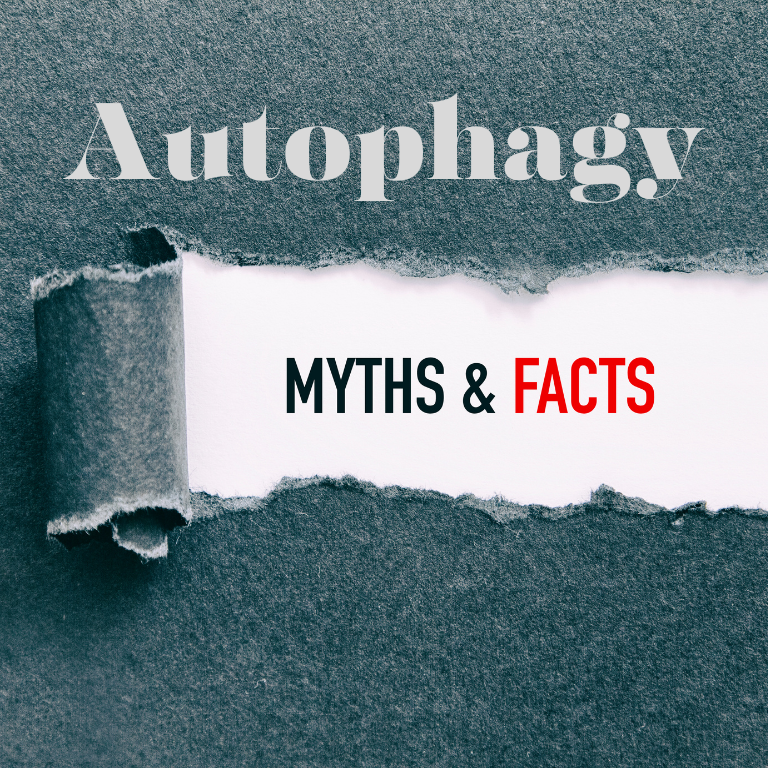
Table of Contents
Introduction
Autophagy, the natural cellular process of recycling and renewal, has garnered significant attention for its potential health benefits. In the sphere of cellular biology, autophagy stands out as a crucial mechanism that facilitates the removal of damaged cellular components and promotes cellular adaptation. Understanding the common misconceptions of autophagy is vital for appreciating its broader impact on health.
How Autophagy Boosts Your Health
Before clarifying the myths surrounding autophagy, let’s take a moment to revisit its numerous health benefits. Autophagy, the innate cellular process responsible for self-cleaning and regeneration, holds a wealth of advantages for overall well-being. Its primary role involves the removal of damaged cellular components, facilitating cellular repair and fortitude. This mechanism significantly contributes to bolstering immunity, providing a defense against various illnesses. Autophagy is also intricately linked to weight management, influencing metabolic processes. Beyond that, through the recycling of cellular components and the elimination of harmful substances, autophagy is associated with promoting longevity and preventing age-related diseases. Moreover, its involvement in energy production and cellular adaptation underscores its versatility in sustaining optimal cellular function. Embracing lifestyle practices that stimulate autophagy, such as intermittent fasting and regular exercise, empowers individuals to tap into these benefits, fostering a healthier and more resilient way of life.
Dispelling Common Misconceptions of Autophagy
Navigating through the various myths surrounding autophagy is essential for gaining a more accurate understanding of its role in overall well-being. Let’s explore and debunk some prevalent misconceptions about autophagy to foster a clearer perspective on how this cellular process truly contributes to a healthier lifestyle.
I. Myth: Fasting is the only way to induce autophagy.
One prevalent myth suggests that fasting is the sole trigger for autophagy. While fasting indeed stimulates this process, it’s essential to recognize that other lifestyle factors play a role. Regular exercise, specific dietary changes, and even adequate sleep contribute to the activation of autophagy.
II. Myth: More autophagy is always better.
Contrary to the belief that heightened autophagy is universally beneficial, it’s crucial to maintain a balance. Excessive or prolonged autophagy may lead to the degradation of essential cellular components, emphasizing the importance of moderation in promoting this process.
III. Myth: Autophagy is only relevant to weight loss.
Beyond its association with weight management, autophagy extends its impact on cellular repair, immunity, and overall longevity. Dismissing it as solely relevant to weight loss overlooks its multifaceted contributions to various aspects of health.
IV. Myth: Younger individuals don’t need to worry about autophagy.
While autophagy may decline with age, its significance remains paramount at all life stages. Encouraging healthy lifestyle choices, including proper nutrition and regular exercise, becomes crucial for maintaining optimal autophagic activity.
V. Myth: Autophagy is only active in certain organs or tissues.
Autophagy is not confined to specific areas of the body; it occurs throughout various tissues and organs. Recognizing its systemic importance highlights the interconnectedness of autophagy with overall health.
VI. Myth: Supplements alone can induce autophagy effectively.
While certain supplements may support autophagy, relying solely on them is insufficient. A holistic approach that includes regular exercise, a balanced diet, and sufficient sleep is essential for the sustained activation and maintenance of autophagy.
VII. Myth: Autophagy is a cure for all diseases.
Positioning autophagy as a cure-all oversimplifies its role. While it contributes significantly to health, it is just one component of a comprehensive approach that includes a healthy lifestyle, proper medical care, and strategies for disease prevention.
VIII. Myth: Everyone experiences the same level of autophagy during fasting.
Individual responses to fasting-induced autophagy can vary due to factors like genetics, age, and overall health. Recognizing the diversity in responses emphasizes the need for personalized approaches rather than a one-size-fits-all mentality.
IX. Myth: Autophagy is only relevant to cellular “clean-up.”
While autophagy aids in the removal of damaged cellular components, its functions extend beyond mere “clean-up.” It plays a crucial role in energy production, nutrient recycling, and cellular adaptation, showcasing its versatility.
Conclusion
In summary, it is of paramount importance to address and clarify the prevalent and common misconceptions of autophagy. This process is crucial for cultivating a profound understanding of the valuable contributions autophagy makes to the broader spectrum of overall health. By acknowledging the intricacies and embracing the complexity inherent in autophagy, individuals are empowered to make well-informed choices that actively contribute to the support and enhancement of their overall well-being. This comprehensive understanding not only dispels misconceptions but also encourages a more thoughtful and holistic approach to integrating autophagy-related practices into one’s lifestyle, thereby fostering a healthier and more informed way of living.
Frequently Asked Questions (FAQs)
How can I naturally promote autophagy in my daily life?
Incorporating intermittent fasting, regular exercise, and a nutrient-rich diet can naturally promote autophagy.
Are there specific foods that enhance autophagy?
Foods like green tea, turmeric, and foods rich in omega-3 fatty acids are known to support autophagy.
Can excessive autophagy lead to adverse effects?
Yes, prolonged or excessive autophagy may lead to the degradation of essential cellular components, emphasizing the importance of balance.
How does autophagy contribute to longevity?
Autophagy supports cellular repair and adaptation, contributing to overall longevity by maintaining cellular health.
Is there ongoing research on autophagy and its applications?
Yes, ongoing research explores the potential applications of autophagy in various health conditions, showcasing its evolving significance.
For general inquiries, feedback, questions, and suggestions about our content, please feel free to – Contact Us
